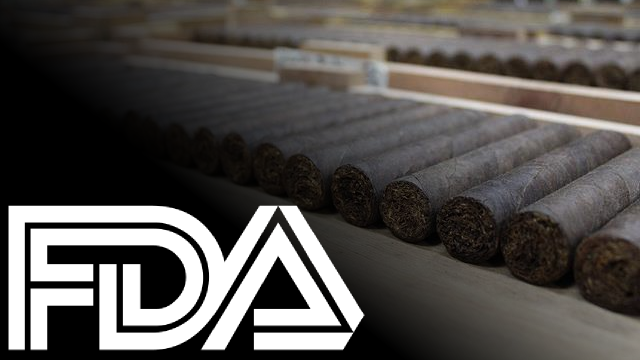
The deadline for submitting comments on the FDA’s proposed cigar regulations is Friday, August 8 (tomorrow). If you haven’t yet registered your opinion to help protect handmade cigars, please do so. (See our tip for what to tell the FDA here.)
As you might expect, here at StogieGuys.com we’re registering our comment, and we wanted to share with you what we told the FDA:
We strongly oppose the FDA extending its jurisdiction as proposed in the Deeming Document, and specifically oppose any attempt by the FDA to regulate handmade cigars. However, if the FDA moves forward with the regulations proposed in the deeming document, it should employ the exemption proposed under Option 2, with the following changes: (1) any reference to cigar pricing ($10 or otherwise) should be eliminated from the definition of cigars exempt under Option 2, and (2) the requirement that cigars not have characterizing flavors should be eliminated.
In support of this position, we submit the following points:
Cigars are fundamentally different from cigarettes and most other types of tobacco.
As the Publisher and Editor-in-Chief, respectively, of StogieGuys.com we have been writing about handmade cigars since 2006 and have published thousands of articles and over 750 reviews of handmade cigars. The very nature of our site shows why FDA regulation of handmade, or “premium,” cigars is unwarranted.
A similar site about cigarettes would never exist and could not generate the readership that our site has because cigarettes are a nicotine delivery device, while cigars are a handmade product which exists completely independent of its ability—or more realistically, relative lack of ability—to deliver nicotine. What makes certain cigars good or bad has nothing to do with the nicotine content, and everything to do with the skill that went into making and blending them.
For a person seeking to fulfill their addiction or desire for nicotine, handmade cigars will always be an unappealing and irrational way to attempt to fulfill that desire. Â This is particularly true for minors (for whom purchasing tobacco products are already illegal) because they will always have more access to other tobacco products, and will always find that there are easier ways to obtain nicotine through products that are already approved under existing tobacco regulations.
The FDA should not extend authority at all, and certainly not to handmade cigars, because it lacks the ability to do so.
The FDA, like all government agencies, has a limited budget (our national debt is currently increasing at over $2 billion every day), which is why the real question the FDA should be evaluating is not “Should the FDA should regulate cigars?” but “Should the FDA divert resources from its other activities, including existing tobacco regulations, to regulate cigars?” The answer clearly is no.
The FDA has not shown it has the capacity to carry out its existing tobacco regulations. Of the thousands of new products waiting for approval, only a few dozen have been ruled on so far. This demonstrates the FDA does not have the capacity to extend its regulations to handmade cigars. The FDA is specifically not authorized by Congress to ban cigars or other types of tobacco, and given the inability to handle existing pending approvals, expanding jurisdiction to handmade cigars would result in a de facto ban on new cigars because the agency has not demonstrated the ability to approve additional tobacco products at all, let alone in a timely fashion.
Given that Congress mandated that the FDA regulate cigarettes, but left it up to the agency’s discretion whether or not to regulate cigars, the FDA should respect the priorities of Congress and not add cigars to its already overwhelmed regulatory jurisdiction. This is compounded by the number of new cigar products that are introduced every year. While there is no reason to believe that new cigars are at all different in their impact on public health (new products are almost entirely made by changing the blend and ratio of tobaccos used in existing products) every year hundreds or even thousands (if new sizes are each considered a new product) of new cigars are introduced. This would overwhelm existing FDA product approvals and make it more difficult for the agency to fulfill its core mission of regulating cigarettes.
If the FDA erroneously chooses to regulate cigars, it should adopt a premium handmade cigar exemption that doesn’t rely on an arbitrary price, or flavor distinctions.
In the Deeming Document the FDA proposes Option 2, which includes an exemption for premium cigars. This is an important realization of the fact that premium handmade cigars do not pose the same public health concerns that cigarettes do. However, the arbitrary and unscientific $10 price floor should be abandoned.
Simply put, there is no scientific or public health reason for the exemption to rely on a $10 retail price, and the FDA has never demonstrated that one exists. Furthermore, the arbitrary price point doesn’t reflect any reality of the handmade cigar industry. If the FDA insists on a price-based definition of handmade or premium cigars, it should look to Congress to draw the line. To the extent Congress has drawn such a line, it did so in the SCHIP tax rates, which decided to limit taxes to the first 40.26 cents of the wholesale price per cigar. More importantly, any definition that includes production techniques will make it impossible to produce a cigar below a certain price, which sets an organic, as opposed to an arbitrary, price definition.
“Flavored” or infused cigars also represent an arbitrary and unscientific differentiation that should be rejected. No evidence that we know of, or has been presented by the FDA, demonstrates that these cigars pose any additional public health risks.
For these reasons, if the FDA intends to base its regulations on scientific evidence and not on arbitrary standards, it should reject any definition of premium or handmade cigars that includes flavor or a price, while it adopts an exemption for premium handmade cigars.
FDA regulations on premium cigars will cost jobs, both domestically and abroad.
It should also not go unnoticed that aside from the dubious public health justifications for regulating handmade cigars, there are significant human costs to such regulations. Thousands of jobs within the United States would be put at risk if the FDA regulates handmade cigars as proposed, and tens of thousands of individuals in developing countries (particularly the Dominican Republic, Nicaragua, and Honduras) would lose one of their best opportunities for a good job.
The burdens that proposed FDA regulations pose to small businesses—whether cigar shops in this country or cigar factories abroad—would have a huge costs and eliminate countless jobs, especially in places where good jobs are very hard to find. So while regulating cigars would accomplish little if anything in regards to public health here in the United States, it would effectively doom tens of thousands of people to worse lives. Any calculus for public health should not ignore this serious impact.
The FDA should focus on existing regulations, not expanding new regulations to handmade cigars.
Given the existing backload of tobacco products waiting for a ruling from the FDA, it is clear that the agency lacks the resources to regulate cigars. Because diverting limited resources to regulating cigars means less resources for other FDA activities—specifically other tobacco regulations—regulating handmade cigars is not only unnecessary but actually detrimental to the FDA’s public health goals. To the extent there is any doubt on this issue, the FDA should defer any decision on regulating cigars to a later date after it proves capable of fulfilling its existing mandate to regulate cigarettes and other types of tobacco that can have a substantial impact on public health.
As handmade cigar smokers and experts writing about the industry daily since 2006, it is abundantly clear to us that handmade cigars are inherently different from other tobacco products. In proposing an exemption for premium cigars it did just that, but it did so in a clumsy and arbitrary way. If the FDA is serious about fulfilling its Congressionally-authorized mandate, it should not expand its regulations to include handmade cigars. However, if the FDA insists on expanding oversight it should adopt a broad exemption for handmade premium cigars that does not include a characterizing flavor or arbitrary price definition.
Failure to take these suggestions into consideration will make clear to cigar smokers and the premium tobacco industry that the FDA is less interested in public health and more concerned with stifling cigar innovation, eliminating cigar-related jobs, increasing the costs of cigars, and limiting the ability of consenting adults to enjoy premium cigars.
–The Stogie Guys
photo credit: Stogie Guys





 Patrick Ashby
Co-Founder & Editor in Chief
Patrick Ashby
Co-Founder & Editor in Chief Patrick Semmens
Co-Founder & Publisher
Patrick Semmens
Co-Founder & Publisher George Edmonson
Tampa Bureau Chief
George Edmonson
Tampa Bureau Chief